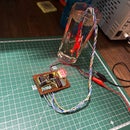Introduction: Arduino Digital Clock Using 7 Segment Display
In this post we are going to learn how to construct 16 digit – 7 segment display digital clock using Arduino. The clock will display date, time and temperature. The clock can be powered with any 5V supply and requires very little power. The brightness can also be adjusted with only a simple change in code. For driving the display units I will be using MAX7219. You may read my blog on how to use MAX7219 with arduino here.
Step 1: RTC Module
In this project I will be using Chronodot 2.0 module. It has a DS3231 chip in a circular breakout board. Read more about using chronodot with arduino here.
The second image is also a RTC module which has the same chip in a rectangular breakout board. Either of them could be used for this project.
The RTC module has a battery holder to power the chip when the clock and microcontroller is off. It will keep the date and time until you remove this coin cell from the module.
Step 2: Circuit Diagram
The circuit is very very straight forward. Since one MAX7219 can display only 8 digits, so I have used two MAX7219 chips to display 16 digits. The two MAX7219 ICs can be daisy chained to work together. If you are interested in details about using MAX7219 with Arduino then read my blog here.
In addition to the circuit diagram shown here, I have added two electrolytic capacitors to reduce the noise from power supply. One of the capacitors must be as close as possible near the microcontroller.
You can download the schematic in PDF also.
Attachments
Step 3: Arduino Code
You can download the code directly from this step. For uploading to microcontroller I will be using FTDI module. If you don't know how to use, you may read this blog. After you upload the sketch, your clock should work exactly as shown.
Attachments
Step 4: Make a Box With MDF Board
Finally you can make a box for your digital clock using plywood or MDF boards. I used MDf as its easy to cut and can be glued using paper glue.
If you want more tutorial and projects, please subscribe to my YouTube channel here: Digital Electronics Circuits Lab
Like and Follow my facebook page here: https://www.facebook.com/digitaleclab
Follow me on instagram here: https://www.instagram.com/digitaleclab/
Link to my website for more projects like this: https://digitaleclab.com/







